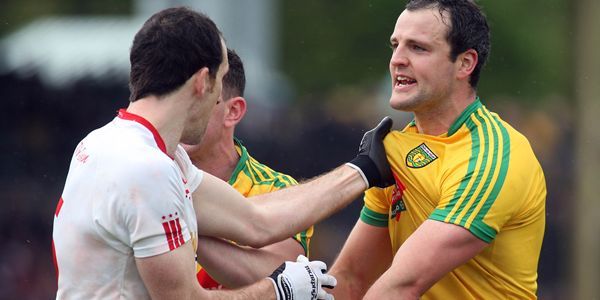

Share
23rd May 2015
02:06pm BST

***
Sledging is a behaviour to gain a competitive edge and you have to understand it that way. I think it's hard to know or understand if a player does this on their own or if they are encouraged by management. Even if we are to assume that something is pre-mediated, then you have no idea of the intensity of the behavior that's agreed between parties. Before a game, a manager may allude to a perception that an opponent might be easily put off his game. That is not strictly bad management, but a player may take that to a level that is probably unacceptable. It's hard to know if that goes on and make assumptions like that. I would be very reluctant to suggest that sledging is disgusting behaviour. It can go to intense levels that are unacceptable and not part of the game, but sledging itself in its purest form is just going to be part of the game. What is unique about last week's report of so called 'sledging' is the nasty or personal element to what has been allegedly said to various players.
As a sports psychologist, I have to try and go beyond what is actually being said and, in my opinion, there is no excuse for being personal or particularly vicious.
It has always been around in other sports such as cricket, rugby, basketball or boxing, but this week, because of what has been allegedly said, it has really captured people's attention.
You find this in individual sports as well – not to try and run down their opponent, but actually to try and give themselves an edge.
It's not to negatively impact their opponent but to be a positive on their own performance, to almost 'big themselves up' because of their own confidence or their own perception of their confidence.
I think it's a scrutiny and a test of mental toughness.
The coach's role, and the player's role, is to try and de-personalise the situation and act in a rational manner and it's not easy but I'm aware of that.
Winning stuff isn't easy either though.
What is unique about last week's report of so called 'sledging' is the nasty or personal element to what has been allegedly said to various players.
As a sports psychologist, I have to try and go beyond what is actually being said and, in my opinion, there is no excuse for being personal or particularly vicious.
It has always been around in other sports such as cricket, rugby, basketball or boxing, but this week, because of what has been allegedly said, it has really captured people's attention.
You find this in individual sports as well – not to try and run down their opponent, but actually to try and give themselves an edge.
It's not to negatively impact their opponent but to be a positive on their own performance, to almost 'big themselves up' because of their own confidence or their own perception of their confidence.
I think it's a scrutiny and a test of mental toughness.
The coach's role, and the player's role, is to try and de-personalise the situation and act in a rational manner and it's not easy but I'm aware of that.
Winning stuff isn't easy either though.
 I've not come across anything that was a serious accusation in my own career. I think it might be a good idea to accept that it will happen and then you deal with it. You have to prepare for something like this.
You start with yourself and know your own identity. What is your own motivation to win the game or is it more than winning? Is your own desire to do with ego or the process? If your own motivation is to stick with the process that got you to a certain stage of a competition, then you should be able to overcome something like this.
You have to know your activation levels during a game – are they high or low? – and you prepare for it in different ways as well.
I think if players engage in any sort of mental preparation such as visualisation then you can build verbal and physical confrontation into that type of preparation.
You also have techniques during performance and some are very visible during other sports and not always to do with sledging as such but to with the process.
Some players tie their shoelaces, others look up to the sky because the colour blue might have a calming effect and we all see tennis players pick at their racquet after a point. They are the visible ones.
I've not come across anything that was a serious accusation in my own career. I think it might be a good idea to accept that it will happen and then you deal with it. You have to prepare for something like this.
You start with yourself and know your own identity. What is your own motivation to win the game or is it more than winning? Is your own desire to do with ego or the process? If your own motivation is to stick with the process that got you to a certain stage of a competition, then you should be able to overcome something like this.
You have to know your activation levels during a game – are they high or low? – and you prepare for it in different ways as well.
I think if players engage in any sort of mental preparation such as visualisation then you can build verbal and physical confrontation into that type of preparation.
You also have techniques during performance and some are very visible during other sports and not always to do with sledging as such but to with the process.
Some players tie their shoelaces, others look up to the sky because the colour blue might have a calming effect and we all see tennis players pick at their racquet after a point. They are the visible ones.
I like to use the analogy of traffic lights. Green is good, amber is on the edge, and to try and maintain the mentality of a player to go from amber to green, and not go from amber to red, is all part of the process within a team.Even something like interaction with someone on the team – a captain having a word or the intervention of a friend on can help keep things in perspective in a heated situation. You can also seek to visualise the type of situation where you are getting intimidated and being the subject of sledging from opposition players or coaches or the crowd, whatever it may be. You can attempt to put that into your preparation the games so it's a rehearsal for the game and you can perform regardless of it. What we are really talking about is on a grand scale inducing pressure in preparation so players can become immune to it when they're performing.
 It's very difficult to empathise with what the 'victim' of the experience goes through at that point in time, but you're still talking about a football game.
It seems now that when people are talking about matches, even if they are involved or not, it tends to stray into a dramatic version.
We call it 'war' or a 'battle' and so on but in reality players need to be aware of the mentality that's required to play a football match and that's not the same mentality you need when you're going to actual war.
There can also often be the perception that whatever a player does on the field does not define him or her off it and I would agree with that.
Just because someone may do something that may disgust on the field, it does not automatically make them a disgusting person away from sport.
There has to be a distance from a persona assumed on the field against the actual personality and characteristics of a person. There is no generalisation.
You can contact Emmett on Twitter
It's very difficult to empathise with what the 'victim' of the experience goes through at that point in time, but you're still talking about a football game.
It seems now that when people are talking about matches, even if they are involved or not, it tends to stray into a dramatic version.
We call it 'war' or a 'battle' and so on but in reality players need to be aware of the mentality that's required to play a football match and that's not the same mentality you need when you're going to actual war.
There can also often be the perception that whatever a player does on the field does not define him or her off it and I would agree with that.
Just because someone may do something that may disgust on the field, it does not automatically make them a disgusting person away from sport.
There has to be a distance from a persona assumed on the field against the actual personality and characteristics of a person. There is no generalisation.
You can contact Emmett on TwitterExplore more on these topics: